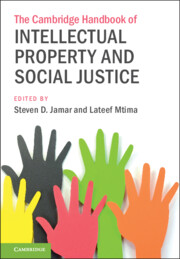Book contents
- The Cambridge Handbook of Intellectual Property and Social Justice
- The Cambridge Handbook of Intellectual Property and Social Justice
- Copyright page
- Dedication
- Contents
- About the Contributors
- Foreword
- Prolusion: What Is Intellectual Property (And Why Should You Care About It Anyway?) – A Layperson’s Guide to Intellectual Property Law
- Introduction: Intellectual Property Social Justice Theory: History, Development, and Description
- Part I IP Social Justice Foundations
- 1 Mapping the Intellectual Property/Social Justice Frontier
- 2 The Indians Who Were Not Heard and the Band That Must Not Be Named: Racial Formation and Social Justice in Intellectual Property Law
- 3 Intellectual Property Social Justice: A Theoretical Rationale
- Part II IP Social Justice in Major Intellectual Property Domains
- Part III IP Social Justice: Historical Perspectives
- Part IV IP Social Justice in the Political Economy: Engaging Activism; Achieving Change
- Part V IP Social Justice in the Information Age
- Part VI Intellectual Property Social Justice in Global Perspective: Issues in Gender and Development Disparity
- Part VII IP Social Justice: The Future of the Global IP Ecosystem
1 - Mapping the Intellectual Property/Social Justice Frontier
from Part I - IP Social Justice Foundations
Published online by Cambridge University Press: 04 January 2024
- The Cambridge Handbook of Intellectual Property and Social Justice
- The Cambridge Handbook of Intellectual Property and Social Justice
- Copyright page
- Dedication
- Contents
- About the Contributors
- Foreword
- Prolusion: What Is Intellectual Property (And Why Should You Care About It Anyway?) – A Layperson’s Guide to Intellectual Property Law
- Introduction: Intellectual Property Social Justice Theory: History, Development, and Description
- Part I IP Social Justice Foundations
- 1 Mapping the Intellectual Property/Social Justice Frontier
- 2 The Indians Who Were Not Heard and the Band That Must Not Be Named: Racial Formation and Social Justice in Intellectual Property Law
- 3 Intellectual Property Social Justice: A Theoretical Rationale
- Part II IP Social Justice in Major Intellectual Property Domains
- Part III IP Social Justice: Historical Perspectives
- Part IV IP Social Justice in the Political Economy: Engaging Activism; Achieving Change
- Part V IP Social Justice in the Information Age
- Part VI Intellectual Property Social Justice in Global Perspective: Issues in Gender and Development Disparity
- Part VII IP Social Justice: The Future of the Global IP Ecosystem
Summary
For a growing portion of our society, and especially younger generations, life increasingly revolves around intellectual creativity, entrepreneurship, and the digital domain. General Motors and other manufacturing companies are no longer the largest and most significant economic enterprises. Digital Age startups, such as Apple, Google, Facebook, Amazon, and Netflix, provide the social and commerce platforms of daily life. They dominate the business news. Tesla is revitalizing the American automobile industry and revolutionizing automobile transportation. The balance sheets of these companies are not based on tangible resources but rather intangibles – intellectual property rights, information, and human capital. As President Obama emphasized in his final State of the Union Address,1 technological innovation provides the greatest hope for addressing the most pressing human challenges – climate change, public health, food and fresh water supply, and world peace. Social interaction occurs more and more in cyberspace, a seemingly infinite, borderless “place.” And a growing proportion of the most salient “property” rights issues that concern netizens and the U.S. judiciary relate to information resources and digital technology.
- Type
- Chapter
- Information
- Publisher: Cambridge University PressPrint publication year: 2024



